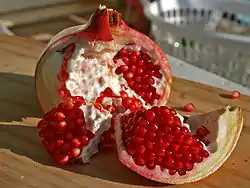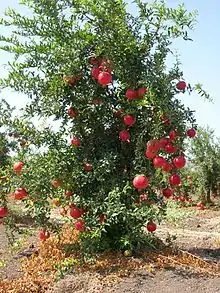pomegranate
English
WOTD – 8 April 2021
Etymology

A pomegranate fruit (sense 1).

A pomegranate tree (sense 2).
The noun is derived from Middle English pome-garnet, pome-garnete, pome garnate, pome granat, pome-granate (“pomegranate fruit; pomegranate tree; pomegranate seeds (?)”) [and other forms],[1] from Anglo-Norman pome gernate, pomme gernette, Middle French pomme granade, pomme granate, pomme grenade, and Old French pome grenade, pome grenate, pomme grenate [and other forms] (modern French grenade), probably from Italian pomogranato, pomo granato (though apparently first attested later), and then either:[2]
- from Italian pomo (“fruit, pome; apple”) + Latin (mālum) grānātum, (mālo)grānātum (“pomegranate”); or
- directly from Medieval Latin pōmum garnātum, pōmum grānātum (“pomegranate”), from Latin pōmum (“fruit; fruit tree”) + grānātum (“pomegranate”). Pōmum is possibly ultimately derived from Proto-Indo-European *h₂po-h₁ém-os (“taken off”) (in the sense of being picked off a plant), from *h₂epó (“away; off”) + *h₁em- (“to distribute; to take”); while grānātum is derived from grānātus (“having many grains or seeds”), from grānum (“grain, seed, small kernel”) (possibly ultimately from Proto-Indo-European *ǵerh₂- (“to mature, grow old”) + *-nós (suffix forming verbal adjectives)) + -ātus (suffix forming adjectives indicating the possession of a quality or thing from nouns).
The adjective is derived from the noun.[2]
Pronunciation
- (Received Pronunciation) IPA(key): /ˈpɒmɪ(ˌ)ɡɹænɪt/
Audio (RP) (file) - (General American) IPA(key): /ˈpɑmɪˌɡɹænɪt/, /ˈpɑməˌɡɹænət/, /ˈpɑmˌɡɹænət/
- Hyphenation: po‧me‧gra‧nate
Noun
pomegranate (plural pomegranates)
- The fruit of the Punica granatum, about the size of an orange with a thick, hard, reddish skin enclosing many seeds, each with an edible pink or red pulp tasting both sweet and tart.
- 1725, Homer; [Alexander Pope], transl., “Book VII”, in The Odyssey of Homer. […], volume II, London: […] Bernard Lintot, OCLC 8736646, lines 148–151, page 106:
- Here the blue fig with luſcious juice o'erflows, / With deeper red the full pomegranate glows, / The branch here bends beneath the weighty pear, / And verdant olives flouriſh round the year.
- 1834, [Edward Bulwer-Lytton], “The Temple of Isis.—Its Priest.—The Character of Arbaces Developes Itself.”, in The Last Days of Pompeii. […], volume I, London: Richard Bentley, […]; successor to Henry Colburn, OCLC 230668731, book I, page 68:
- In the walls of the cells, elevated on seven steps of Parian marble, various statutes stood in niches, and those walls were ornamented with the pomegranate consecrated to Isis.
- 1851, Henry Wadsworth Longfellow, The Golden Legend, Boston, Mass.: Ticknor, Reed, and Fields, OCLC 276669, page 147:
- Another goblet! quick! and stir / Pomegranate juice and drops of myrrh / And calamus therein!
- 2001, Vern L. Bullough (editor), Herbal Contraceptives and Abortifacients, Encyclopedia of Birth Control, page 125
- The seeds of the pomegranate, for example, were widely used to prevent conception in the ancient world and they are still used in India, East Africa, and the Pacific.
- 2005, Payam Nabarz, The Mysteries of Mithras: The Pagan Belief That Shaped the Christian World, page 79,
- Persephone is taken to the underworld by Hades to be his queen. She willingly eats a seed of pomegranate and is forced to spend every winter with her husband in the land of the dead, symbolizing the yearly decay and revival of vegetation. […] In Judaism, the number of seeds in a pomegranate is said to be the exact number of mitzvah, or spiritual duties required of a devout Jew.
- 2006, Wayne Gisslen, Professional Cooking, College Version, page 683,
- The pomegranate is a subtropical fruit about the size of a large apple.
- 2011, David Joachim, Fire It Up: 40 Recipes for Grilling Everything, page 310,
- The grilled leeks are then drizzled with a gorgeous, ruby-red pomegranate vinaigrette.
-
- The shrub or small tree that bears the fruit.
- 1644 February 18 (Gregorian calendar), John Evelyn, “[Diary entry for 8 February 1644]”, in William Bray, editor, Memoirs, Illustrative of the Life and Writings of John Evelyn, […], volume I, 2nd edition, London: Henry Colburn, […]; and sold by John and Arthur Arch, […], published 1819, OCLC 976971842, page 41:
- I finish'd this day with a walke in the greate garden of the Thuilleries, which is rarely contrived for privacy, shade, or company, by groves, plantations of tall trees, especialy that in ye middle, being of elmes, another of mulberys. There is a labyrinth of cypresse, noble hedges of pomegranates, fountaines, fishponds, and an aviary.
- 1813, Lord Byron, The Giaour, a Fragment of a Turkish Tale, London: […] T[homas] Davison, […], for John Murray, […], OCLC 4561022, page 13:
- On her fair cheek’s unfading hue, / The young pomegranate’s blossoms strew / Their bloom in blushes ever new— […]
- 2005, Fahiem E. El-Borai, Larry W. Duncan, 12: Nematode Parasites of Subtropical and Tropical Fruit Tree Crops, M. Luc, Richard A. Sikora, J. Bridge (editors), Plant Parasitic Nematodes in Subtropical and Tropical Agriculture, 2nd Edition, page 481,
- The pomegranate (Punica granatum L.) originates from Persia, and is cultivated in western and central Asia and in the Mediterranean region; it is also grown commercially in California. […] The predominant parasitic nematodes affecting pomegranate are the root knot nematodes, M.[Meloidogyne] incognita, M. acrita and M. javanica (McSorley, 1981).
- 2005, Payam Nabarz, The Mysteries of Mithras: The Pagan Belief That Shaped the Christian World, page 79,
- The pomegranate is the tree of knowledge in some myths. In others, it is linked with the underworld, […].
- 2008, M. N. V. Prasad, Trace Elements as Contaminants and Nutrients, page 225,
- In this experiment, the average Zn concentration of leaf in four pomegranate cultivars was between 12.0 and 19.8mg/kg in the control (Fig. 2a).
-
- A dark red or orange-red colour, like that of the pulp or skin of a pomegranate fruit.
- pomegranate:
- (Australia, colloquial, derogatory, obsolete) A person of British descent, especially one who has (recently) immigrated to Australia; a pom, a pommy.
Derived terms
- pom
- pomegranateade (rare)
- pomegranatelike, pomegranate-like
- pomegranate molasses
- pomegranate water
- pommy
- Socotra pomegranate (Punica protopunica)
Translations
fruit of the Punica granatum
|
Punica granatum shrub or small tree
|
dark red or orange-red colour, like that of the pulp or skin of a pomegranate fruit
person of British descent — see pommy
See also
- grenade
- grenadine (“cordial or drink made from pomegranates”)
- Appendix:Colors
Adjective
pomegranate (comparative more pomegranate, superlative most pomegranate)
- Of a colour like that of the pulp or skin of a pomegranate fruit; dark red or orange-red.
- c. 1855, Charlotte Brontë, “Emma. (A Fragment of a Story by the Late Charlotte Brontë.)”, in The Cornhill Magazine, volume I, number 4, London: Smith, Elder and Co., […], published April 1860, OCLC 561748243, chapter II, pages 494–495:
- Many people would think Miss Wilcox, standing there in her blue merino dress and pomegranate ribbon, a very agreeable woman.
-

Pomegranate also means dark red or orange-red, that is, having a colour like that of the pulp or skin of a pomegranate fruit.
Translations
of a colour like that of the pulp or skin of a pomegranate fruit
References
- “pō̆me-garnet(e, n.”, in MED Online, Ann Arbor, Mich.: University of Michigan, 2007.
- “pomegranate, n. and adj.”, in OED Online
 , Oxford, Oxfordshire: Oxford University Press, March 2021; “pomegranate, n.”, in Lexico, Dictionary.com; Oxford University Press, 2019–2022.
, Oxford, Oxfordshire: Oxford University Press, March 2021; “pomegranate, n.”, in Lexico, Dictionary.com; Oxford University Press, 2019–2022.
Further reading
 pomegranate on Wikipedia.Wikipedia
pomegranate on Wikipedia.Wikipedia  pomegranate (disambiguation) on Wikipedia.Wikipedia
pomegranate (disambiguation) on Wikipedia.Wikipedia  Punica granatum on Wikimedia Commons.Wikimedia Commons
Punica granatum on Wikimedia Commons.Wikimedia Commons  Punica granatum on Wikispecies.Wikispecies
Punica granatum on Wikispecies.Wikispecies - Douglas Harper (2001–2023), “pomegranate”, in Online Etymology Dictionary.
Anagrams
- magnoperate